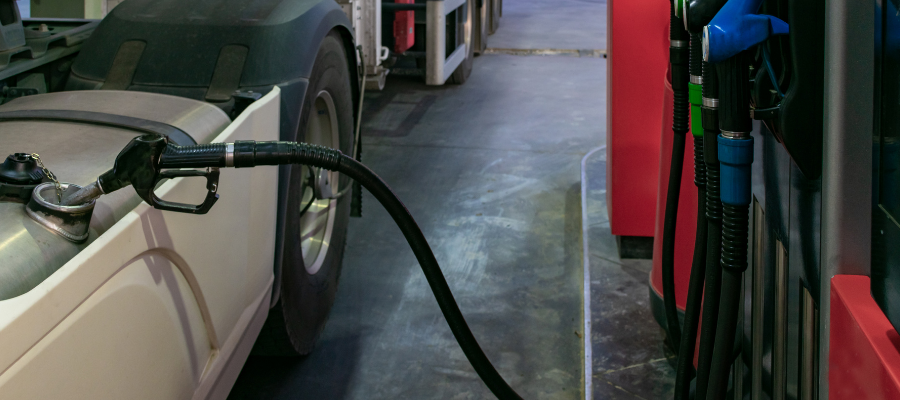🕒 Article read time: 2 minutes
Managing your fuel bill

Fuel is the single biggest cost for most road transport operators.
Since Russia invaded Ukraine at the end of February, geopolitical pressures have combined with spiralling inflation to send average fuel prices at the pump rocketing to record highs. For many logistics businesses operating on wafer-thin margins of around 1%, these rising costs put the commercial viability of their activities at risk.
The Chancellor’s cut in Fuel Duty of five pence per litre announced in the recent Spring Statement, however, has provided some welcome respite from this seemingly unstoppable surge in prices, leading to an average saving of £2,356 per year per 44-tonne truck. But with fuel prices remaining sky high as global supply chain pressures continue, it is worthwhile businesses ensuring that their fuel efficiency strategies are up to date, and their drivers are trained and encouraged to drive in a fuel-efficient manner.
DRIVING DOWN FUEL COSTS
There are a wide array of driving behaviours that have been proven to reduce fuel consumption. This includes minimising engine idling; maintaining a steady speed (avoiding sharp acceleration and braking); staying in gear when slowing but removing pressure on the accelerator early; and avoiding the use of air conditioning if possible. Regular vehicle maintenance has an important role to play too. Using the correct engine oil; checking and maintaining correct tyre pressure; minimising the weight of the vehicle; streamlining the vehicle; and the fitment of aerodynamic devices can all aid greater fuel efficiency.
REMOVING BARRIERS TO EFFICIENT DRIVING
In the document, Efficient Driving: A Rapid Evidence Assessment for the Department for Transport, the authors researched barriers to adopting efficient driving styles. For private drivers, these included awareness of efficient driving techniques; competing priorities (for example, to arrive at a destination as soon as possible); and the presence of other behaviours that drivers can adopt to save either money or emissions (for example, buying a more fuel-efficient car). While the barriers for commercial vehicle drivers were not explored as part of the report, many of those identified for domestic drivers apply to professional drivers too, but it is important for each individual company to review and assess where the shortfalls lie within their workforce.
TRANSFORMATIONAL TECHNOLOGY
This is where use of telematics can be invaluable. This technology can be used to monitor a driver’s behaviour and journeys in a variety of ways, such as identifying instances of harsh braking and activation of Automatic Driver Assistance Systems (ADAS). These insights could then be used to provide additional training to drivers exhibiting poor habits, or to identify times and routes that should be avoided due to higher levels of congestion or even accident risks. By using telematics to monitor driving style and vehicle fuel consumption, operators can protect tight profit margins by training staff in how to increase their fuel efficiency, creating personalised efficient driving training plans to rectify the shortfalls of each driver.
REVIEWING YOUR ROUTES
However, driver behaviour is only one piece of the puzzle in improving fuel economy. Logistics businesses are encouraged to look at their broader supply chain operations too, to assess where reduced or more efficient vehicle movements can be made. This could include nearshoring (moving outsourced operations to closer locations geographically), to reduce the length of transportation for products in the supply chain, or consolidation of loads, once again reducing the number of vehicles on the road through greater planning efficiency.
LESS FUEL = FEWER EMISSIONS
There is more to fuel efficiency than simply a drive to save money; the planet benefits from the reduced carbon emissions too. Many fleet managers are switching their petrol or diesel vans to Battery Electric Vehicles (BEVs) already, with this trend set to grow as the nation strives to reach net zero emissions; fuel price instability could provide another driving factor to make the switch sooner rather than later.
In 2021, Logistics UK launched its Route to Net Zero commitment, asking its members to pledge to decarbonise their operations as quickly and as effectively as possible to help speed up the UK’s path to net zero by 2050. Committed members in the scheme now represent a vast array of companies involved in logistics across all modes and disciplines, including UPS, DHL UK, John Lewis Partnership, Wincanton, Scottish Water, and Royal Borough of Greenwich, as the sector unites to drive forward the decarbonisation of the UK economy. For those employing a dedicated decarbonisation strategy, and wanting support along the way, applying to the Route to Net Zero commitment will be worthwhile.
“Prioritising fuel efficiency and effective fuel management is essential to save costs while reducing the environmental impact of road operations,” said Phil Lloyd, Head of Engineering Policy, Logistics UK, “There are many steps businesses and drivers can take to minimise fuel consumption – from small measures such as maintaining a steady speed while on the road, to larger scale solutions such as reviewing supply chain structures – particularly at a time when fuel prices remain so high.”
*https://logistics.org.uk/fuel
Published On: 07/04/2022 16:00:45

Comments Section
If you are a Logistics UK member login to add comments.